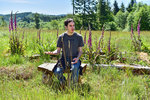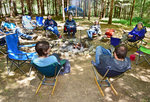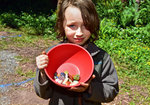



Allen Goulter, 11, of Centralia, paused briefly to listen to one of the mammoth bullfrogs in the nearby pond. It was the one he’d almost caught the day before teasing him — he was sure of it.
Turning back toward camp, he paused to look around at the unspoiled nature around him.
“This is a pretty cool place to camp,” he said.
For the parents of kids like Allen, these moments are more than simply endearing. They are glimpses at the amazing kids these parents know they have. And this space, a campground called Acceptance: A Transformative Place is a chance for their entire families to rest and recharge from the toll that living in the spectrum of Autism disorders can take.
Located between Centralia and Rochester, Acceptance is the brainchild of Danny Raede, CEO and co-founder of Asperger Experts, a Seattle-based online Asperger’s support and education clearinghouse accessed by 500,000 people in 89 countries. Raede, who serves as the Director for the Board of Acceptance, was diagnosed with Asperger’s at age 12.
Asperger’s, often generally referred to as part of Autism Spectrum Disorder, is a neurological condition that means those living with it can become easily overwhelmed by sensations and have difficulty connecting socially.
“A lot of people think Asperger’s is about social skills, the nerdy professor, but it’s really about processing sensations in the world, especially manmade,” Raede explained.
Raede first had the idea for Acceptance about three years ago. He wanted to start a company that was completely separate from Asperger’s Experts but that helped families much in the same way as the established online community. Acceptance bills itself as a place that welcomes “people with Asperger’s, autism, PTSD, anxiety & those that just don’t fit into traditional society.”
“I realized that something that is missing from the marketplace was a family-style retreat where people could go with no expectations and be accepted as they were,” Raede said. “There’s really a lack of experiences where people can get together in a non-therapeutic setting.”
Acceptance officially opened last year and is currently housed at Grey Owl Hollow, a property owned by Seth and Yvonne MacNeely. The MacNeelys are working to create an outdoor event center at the site and also offer the space for camping on hipcamp.com. Seth McNeely said he and Raede met at a conference and bonded over their shared passion for the concept of “nature therapy”, which is the use of the natural environment to help people heal. Raede explained that since people with Asperger’s most often go into “defense mode” from manmade stimulus, being in nature can be a calming, reconnecting experience for many.
The MacNeely family was looking to relocate from the San Diego area and agreed to assist Raede in making his vision a reality by finding a place his family could call home that could also be used as a camp for Acceptance for an interim period.
“This was something I could do out of my resources,” MacNeely said. “A big part of what we want to do here is create a community where people can live and work together and this is perfect for that.”
At the moment, Acceptance is a camping spot that offers pay-what-you-can weekends throughout the summer to those living with Asperger’s. The space looks like a fairly typical campground, with leveled camping spots and a central fire pit where parents tend to congregate while their kids play. On a recent family weekend, less than 24 hours in, kids who had never met one another played as if they were old friends. And their parents reflected on how much it means to them to spend time in a space where they know they are supported.
“I don’t have to explain anything and I don’t have to feel bad,” said Debra Greywolf, of Renton, who brought her son Jakob, 8. “And we haven’t had any incidents but I get the feeling that if something were to happen, everybody would be like ‘I’ve got your back.’”
Raede said families bring all of their camping equipment and food (although the MacNeelys have equipment that can be borrowed if needed). What they get is an instant community of people who understand what their families face. When asked what they wish other parents understood about Asperger’s, the families nodded knowingly when each one spoke.
“The amount of work I go through every day so he is presentable in public,” Greywolf said. “You see ‘well he looks like a normal kid.’ What you don’t see is the three blankets and two pillows in the car and I started to get ready one hour before we had to get into the car.”
“It’s the brushing or the essential oils. It’s whatever that child needs to feel comfortable,” added Melissa Goulter, Centralia, who came with her husband, Jim, and their sons, Allen, 11, Remington, 8, and Connor, 6. “It’s different for every family and each kid but it’s takes A through Z not just ABC.”
“Sometimes, it’s A through Z twice,” added Billie Milliken, of Spokane, who came as a support person for Jeff Sitek of Hauser, Idaho.
In its first summer season, more than 100 guests camped at Acceptance. Visitors came from throughout the Northwest, some traveling from as far away as California. One of Raede’s favorite visitors was a 7-year-old who told him he doesn’t feel like he has autism when he’s at Acceptance. Another favorite memory was with a 20-year-old man who helped him move clear rocks from the main camping area one afternoon.
“At the end of the day, he said to me ‘you know, I think I’m getting a lot out of this program,’ and I said, ‘what program? You’ve been helping me move rocks all day,’” Raede remembered with a laugh. “But I think that shows how the most powerful form of therapy is creating the right environment.”
One of the issues that many parents of children on the autism spectrum face is screen addiction. Raede and MacNeely said they do not apply force to any visitor about the use of screens because when faced with nature, the screens seem to get forgotten.
“So far we haven’t had a single kid be isolated. Within two hours that kid is out of the car and they don’t touch the iPad for the rest of the trip,” MacNeely said. “It’s about trusting in the kid and the environment and trusting in what we’ve created here.”
What they’ve created is a space that is as unlike as possible to our fast-paced world. There are no planned events, only activities when the mood strikes. There might be a hike through the woods, or a spontaneous game of tag or the resident miniature donkey might come down the hill for a visit. But the pace is slow and everyone gets to choose their level of interaction. There are walking trails that wind up a hill from the campground that are mowed into the prairie grasses. There are the beginnings of a winding labyrinth of a path that, when completed, will take at least 10 minutes to walk. It will eventually include a number of nooks like the recently completed meditative space that includes a log bench surrounded by sword ferns and purple hollyhocks.
“We’re trying to design everything to have a purpose,” Raede said. “For instance, winding paths have introspective properties. It allows central nervous system pathways to open. In common lingo, it Zens you out.”
Raede and MacNeely spent several looking before finally deciding on the current 20-acre property. They said they chose it because of its central location within Washington, proximity to city amenities and for the fact that it was situated next door to another 20-acre property that was also for sale. The hope is that if Raede is able to raise enough funds, he would purchase the other property where a permanent retreat center and guest cabins would be built to allow for year-round use of the site for family style retreats as well as potentially an internship type programs for young adults.
So far, the organization has raised about $4,000 of the $250,000 they need. They are awaiting the finalization of their 501(c)3 nonprofit status and are working with an architect to get a conceptual drawing that can be shown to potential donors. For now, though, they can walk visitors to the site they hope to purchase, which includes room for a retreat center as well as about 10 “Hobbit” style guest cabins.